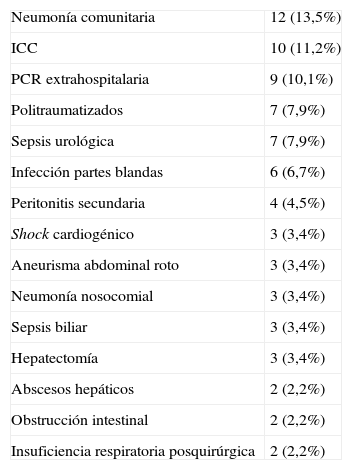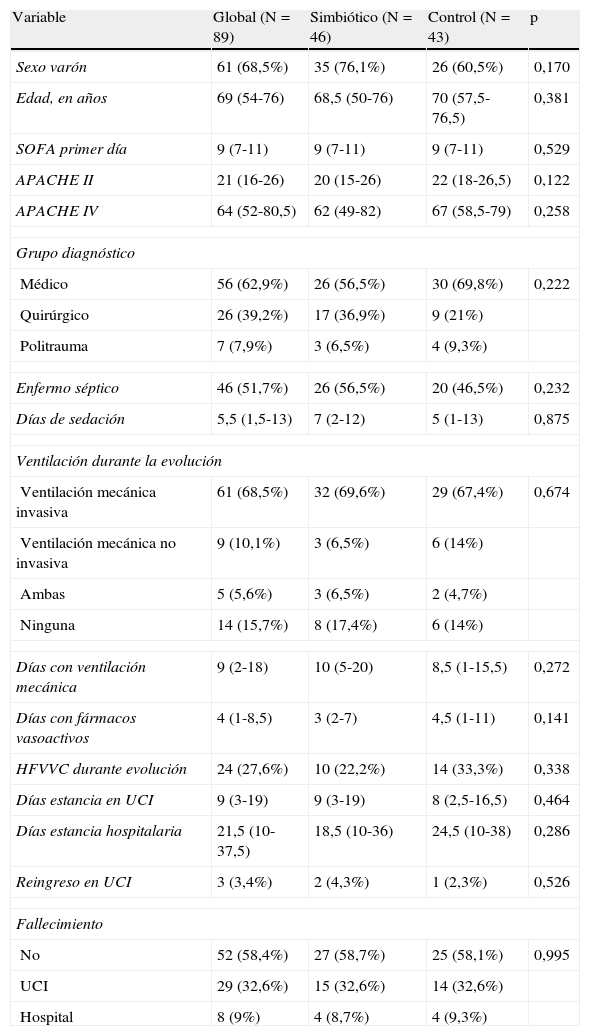Valorar si la utilización de simbióticos mejora la evolución del síndrome de disfunción multiorgánica (SDMO), la respuesta inflamatoria, el patrón de colonización y las infecciones en la Unidad de Cuidados Intensivos (UCI).
Pacientes y métodoEnsayo clínico de grupos paralelos con distribución aleatoria sobre administración durante 7 días de Simbiotic Drink® en pacientes con SDMO. Si existía contraindicación para su administración, pancreatitis o neutropenia, los pacientes fueron excluidos. Las variables evaluadas son: evolución del Sequential Organ Failure Assessment (SOFA), valores sanguíneos de lactato, fibrinógeno y dímero-D, número de infecciones nosocomiales y patrón de colonización.
ResultadosSe incluyeron 89 pacientes, 46 en grupo simbiótico (GS) y 43 en grupo control (GC). La edad mediana fue de 69 años y el 68,5% eran varones. No hubo diferencias en las variables demográficas, puntuaciones de gravedad, variables evolutivas y mortalidad, ni en la evolución del SOFA. El GS presenta menor valor de lactato el segundo día, mayor valor de fibrinógeno los días 5 y 7 y menor valor de los dímeros-D el día 7 de evolución. Se tomaron 895 cultivos para valorar la colonización con 528 gérmenes aislados; no se observaron diferencias en los gérmenes resistentes; en mucosas existió mayor colonización por Candida a partir del tercer día en GC, que desaparece tras el cese de la administración de simbióticos. Veintidós pacientes desarrollaron 33 infecciones en UCI, 14 en el GS (42,4%) y 19 en el GC (57,6%), sin diferencias en los microorganismos, con predominio de candidiasis (4 frente a 0 casos).
ConclusionesLa administración de simbióticos presenta una tendencia a mejorar los valores precoces de lactato y los tardíos de fibrinógeno/dímeros-D, y colonización menor por Candida en mucosas. Sin embargo, no tiene influencia en la evolución del SDMO.
To assess whether the administration of symbiotic preparations in patients with multi-organ failure (MOF) diminishes the evolution of the failure, the inflammatory response generated, the colonization pattern and the Intensive Care Unit (ICU) infectious illness.
Patients and methodRandomized and controlled trial. All patients with MOF were included. Neutropenia and acute pancreatitis patients were excluded. A symbiotic (Simbiotic Drink®) was administered via enteral feeding during the first 7 days. Variables of interest were: Sequential Organ Failure Assessment (SOFA) score evolution, systemic concentrations of lactate, fibrinogen and D-dimer; skin and mucosa colonization and infectious disease register.
ResultsEighty-nine patients were included; 46 in the symbiotic group (SG) and 43 in the control group (CG). There were 68.5% males, with a median age of 69 years. There were no significant differences in the patients’ fundamental characteristics (medical history, age, reason for admission, severity scores), nor in the length of ICU stay or in mortality. Comparing the SG with the CG, there were lower lactate levels on the second day, more fibrinogen levels on the days 5 and 7, and lower D-dimer levels on the day 7. Eight hundred and ninety-five cultures were performed for colonization assessment, with isolation of 528 microorganisms. No differences in microbiological resistance were found; there were more colonization in the SG by Candida in mucous membranes after the third day; this situation resolved after stopping symbiotic administration. Twenty-two patients suffered an infectious disease in ICU, 14 in SG (42.4%) and 19 in CG (57.6%). Although no differences were found in the microbiological pattern, there was a predominance of Candida spp. over other microorganisms (4 vs. 0 cases).
ConclusionsThe symbiotic preparation Simbiotic Drink®, administered in MOF, results in differences to improve the early lactate levels and late fibrinogen/D-dimer levels as well as mucosa colonization by Candida. There were no differences in the ICU evolution.
Artículo
Comprando el artículo el PDF del mismo podrá ser descargado
Precio 19,34 €
Comprar ahora














